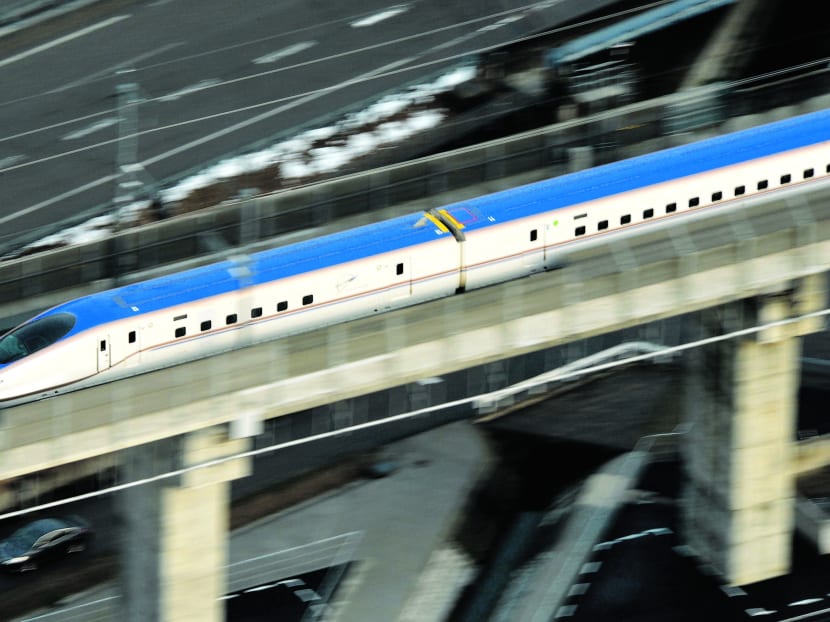Japan rushes ahead at high speed in rail battle with China
TOKYO/BEIJING — When Japan lost out to China on a US$5 billion (S$7 billion) deal to export high-speed rail to Indonesia in October, a nation despaired at the rejection of its beloved Shinkansen, the great symbol of Japan’s technological might.
TOKYO/BEIJING — When Japan lost out to China on a US$5 billion (S$7 billion) deal to export high-speed rail to Indonesia in October, a nation despaired at the rejection of its beloved Shinkansen, the great symbol of Japan’s technological might.
Yet this month it was the other way round as Japan rejoiced in a US$15 billion deal to build a high-speed line between Mumbai and Ahmedabad in India, while Chinese officials insisted they had not lost because there was no open tender.
The battle to sell high-speed rail has become a proxy for the broader competition between Japan and China for industrial supremacy and political influence in Asia. Yet, officials say the cut-throat battle over high-speed rail reflects a different reality — few buyers actually want it.
“The Shinkansen is part of Japan’s identity. We have to try and sell it,” said one senior official in Tokyo of the spectacularly generous financing packages both countries are offering.
The Indian Shinkansen project was won with a US$12 billion loan from Japan at 0.1 per cent over 50 years. It will have a 15-year upfront repayment moratorium and Japan will supplement the loan with a generous package of technical assistance and training. China won the Indonesia project by offering to finance it without any recourse to Indonesia’s government.
Many countries think they want high-speed rail — a prized symbol of economic development — but fewer actually suit it. A high-speed line needs to connect two or more large cities, with reasonably high incomes, neither too close together nor too far apart. Taiwan is the only country to buy the Shinkansen so far and its line makes heavy losses.
“There aren’t very many overseas markets that can support high-speed railways,” said Mr Zhao Jian, a professor at Beijing Transportation University.
In Thailand, for example, the problem is choosing a second city large enough to connect with Bangkok. In Vietnam, Hanoi and Ho Chi Minh City are big enough, but the 1160km distance is too far to compete with air.
China and Japan are trying their best to turn the competition away from finance. “Japan has more experience building high-speed railways,” says Mr Sun Zhang, a railway expert at Tongji University in Shanghai. “But we have built out 10,800km of high-speed railways over the last 12 years. Our high-speed rail is cheaper because of our large-scale production and lower labour costs.”
Japan argues for the Shinkansen’s safety record — there has never been a passenger injury, in contrast to the Wenzhou disaster in China that killed 40 people in 2011 — and claims it is better value in the long run.
“With China creating a gigantic state-owned company, they may be able to manufacture in large volumes at low costs. But once it becomes a competition for initial pricing, it may turn to a war of attrition,” said Mr Toshiaki Higashihara, president of Hitachi, one of the main Shinkansen companies.
“The Japan consortium will be very strong if it can sell not just the railway vehicle but a comprehensive package including operational services over the span of an entire life cycle. I am confident the Japan consortium will not lose against other countries in terms of competitiveness.”
Behind the scenes, the competition is less decorous, with Japanese officials claiming China has no proper business plan for the Jakarta-Bandung line in Indonesia and is making promises it cannot keep. Their favourite example is the Northrail project in Manila, where the Philippines is paying loans to the China ExIm Bank for a railway that never got built.
Still, many Japanese experts also recognise their all-or-nothing approach — buyers have to take the Shinkansen as an integrated system — is a tough sell. “The specs for the Shinkansen are very high,” said Mr Yoshihiko Sato, an industry consultant and author of a book on overseas rail projects. “The exporters want to take the Shinkansen abroad as it is and that’s a challenge.”
Mr Tatsuo Yasunaga, chief executive of trading house Mitsui, said Japanese infrastructure exports will succeed more often if its technologies are combined with those from other countries. “When people talk about exporting infrastructure, they often focus on Japanese content. But Japan has its strengths and weaknesses,” he said.
“We don’t think that we can win with an all-Japan package. You need to constantly think about what the best package is that is competitive.”
Developing countries are crying out for urban railways, and outside the companies with a direct stake in the Shinkansen, many in Japan’s rail industry think metros are a better bet. “My opinion is putting effort into city railways rather than high-speed offers more business chances,” said Mr Sato.
Earlier this year, Sumitomo and Nippon Sharyo won a US$107 million rolling stock contract for the Jakarta metro. Delhi’s successful metro was built with Japanese money and few noticed, amid the high-speed hoopla, a visit by Japanese Prime Minister Shinzo Abe also produced deals to finance systems in Chennai and Ahmedabad.
Mr Yasunaga said Mitsui had long pursued a Brazilian plan for a high-speed rail network linking Rio de Janeiro and Sao Paulo. But it is now working on a metro line in Sao Paulo with Mitsubishi Heavy Industries after the costly bullet train plan faced public opposition.
“Japan can sell its strengths by first helping to build a precise and safe urban transportation system. In that way, it may lead to long-distance lines,” Mr Yasunaga says. FINANCIAL TIMES







